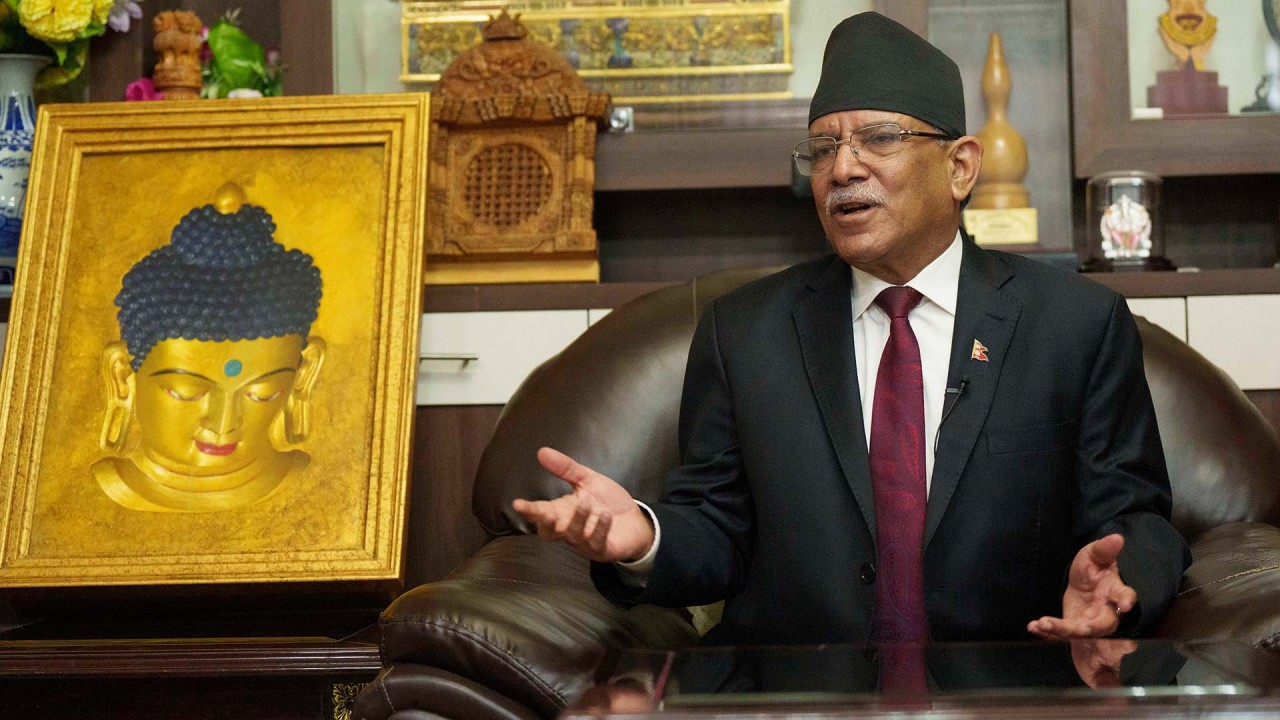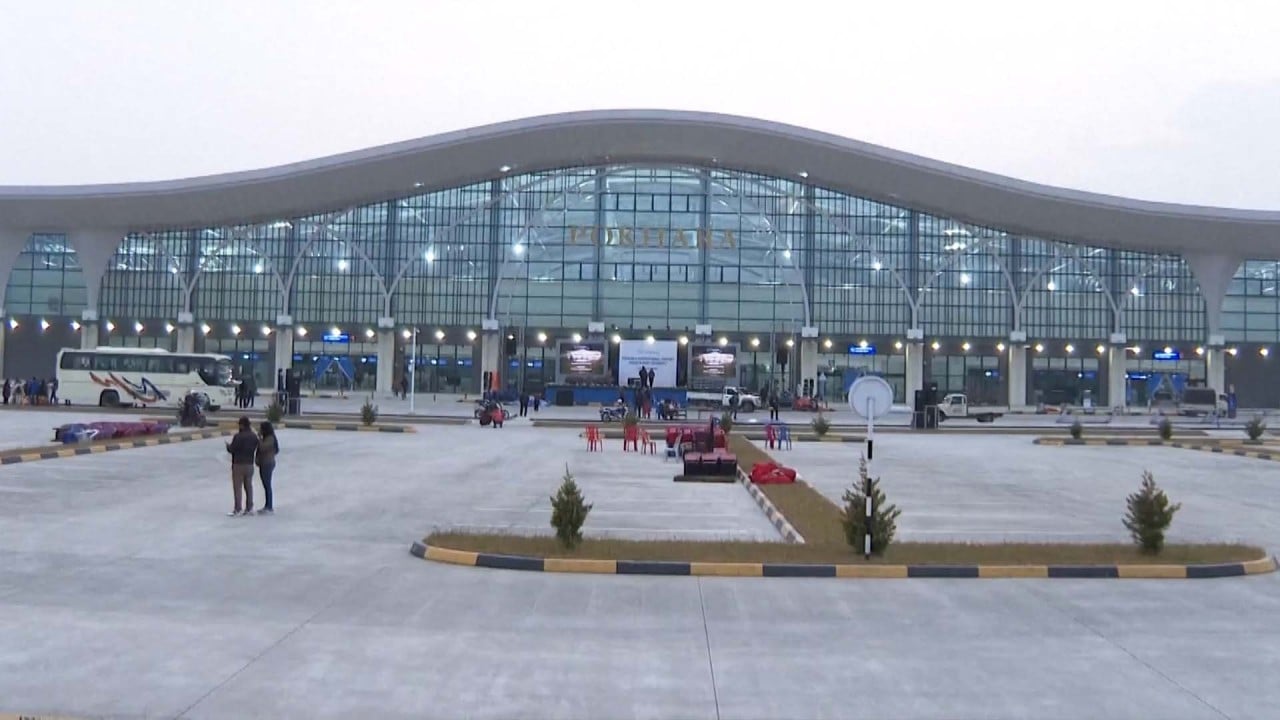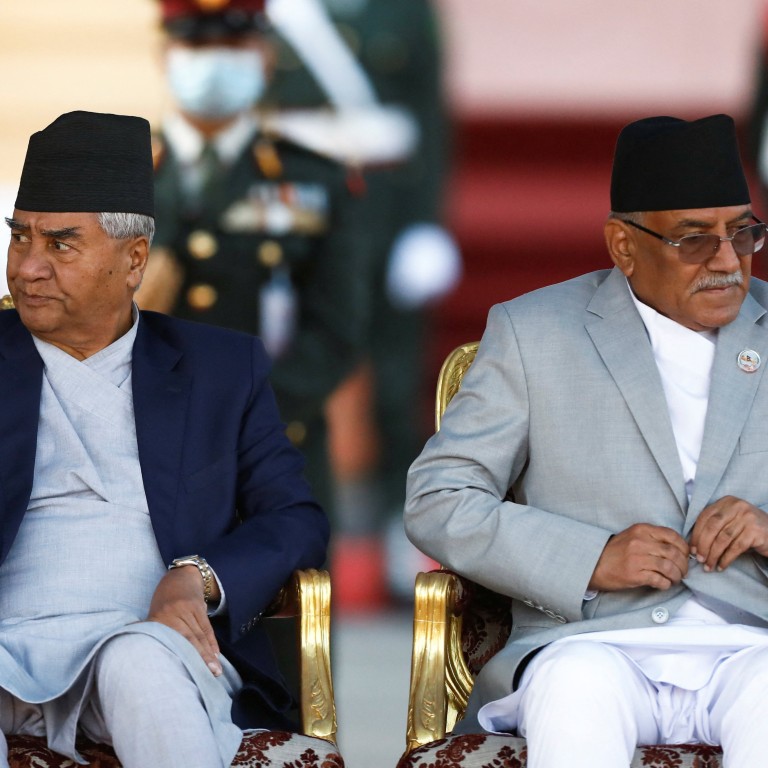
Will US, India benefit from Nepal’s latest political shifts at China’s expense?
- One member of Nepal’s new ruling coalition, former PM Sher Bahadur Debua has been dubbed ‘pro-India’ by the Chinese nationalist tabloid Global Times
- New alliance takes over after former PM KP Sharma Oli, known for his stance against New Delhi and proximity to Beijing, lost his position of power
The realignment of parties in Nepal’s ruling alliance saw the bloc led by former Prime Minister KP Sharma Oli, known for his aggressive rhetoric against New Delhi and proximity to Beijing, losing his position of power.
Instead, former leader Sher Bahadur Deuba’s Nepali Congress (NC), known to pursue stronger ties with India and the US, has stepped in to back the government of the country’s current Prime Minister Pushpa Kamal Dahal “Prachanda”.
In December, Oli and Dahal, both Communist leaders, formed an alliance that analysts said would boost Chinese presence in Nepal.
In the past, Oli has repeatedly taken on India, with some Chinese tabloids referring to him as a “pro-China” leader. In New Delhi’s foreign policy circles, there had been jitters about what the Dahal-Oli alliance would mean for India’s strategic interests.
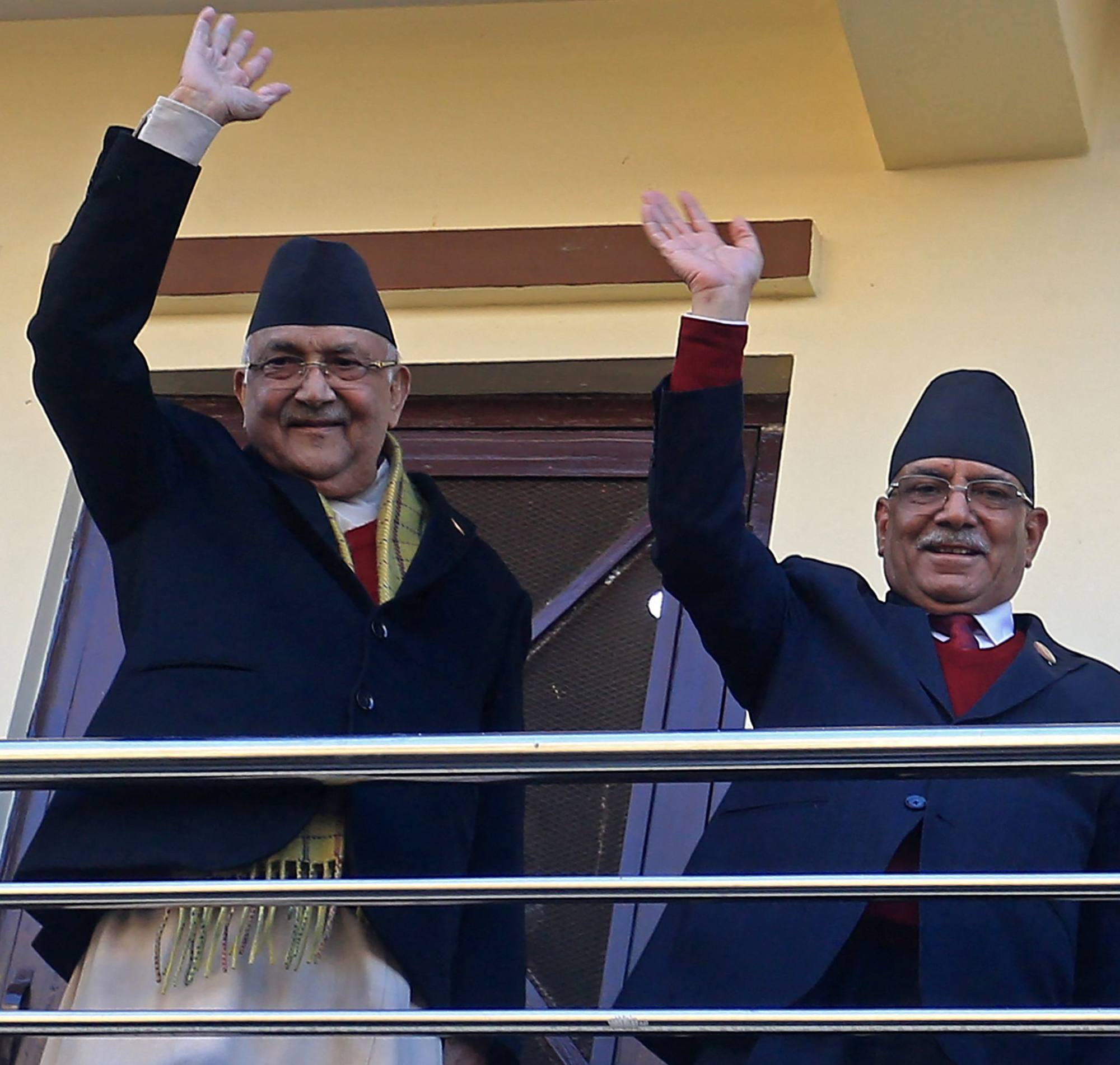
A growing Chinese presence
Nepal has witnessed a series of high-profile visits since the end of December, when Dahal, backed by Oli, was sworn in as the country’s prime minister.
US diplomats, including under-secretary of state for political affairs Victoria Nuland, USAID administrator Samantha Power, and Afreen Akhter, deputy assistant secretary in the Bureau of South and Central Asian affairs, all made trips to Kathmandu, which also welcomed Indian foreign secretary Vinay Mohan Kwatra for a two-day visit in February.
During that same period, China appointed a new ambassador to Kathmandu in Chen Song, who raised eyeballs when he held a series of meetings with Dahal and Oli, among other political leaders.
Nepal is ready for return of Chinese tourists, but will they come?
Observers said this flurry of activity from Beijing was almost certainly noticed by Delhi.
“The Chinese ambassador had media remarks right at the airport on landing, and met a lot of important leaders within days,” said Sangeeta Thapliyal, a professor at the School of International Studies in the Jawaharlal Nehru University’s Centre for Inner Asian Studies.
In early January, the Pokhara Regional International Airport, built with Chinese help, was opened. Beijing also announced the resumption of trade at two points along the China-Nepal border.
“It was a sign of Chinese goodwill, saying that China was happy to work with Dahal,” said Santosh Sharma Poudel, head of the Centre for Strategic Affairs at the Nepal Institute for Policy Research, a Kathmandu-based think tank.
“The Dahal-Oli alliance was an outcome they were happy with,” he added.
A changed scenario
And yet, within months, it was undone when Oli’s Communist Party of Nepal-Unified Marxist Leninist (UML) withdrew its support for Dahal in late February, after Dahal’s Communist Party of Nepal (CPN) extended support to the candidate floated by Deuba’s party for the presidential polls, Ram Chandra Poudel.
Now, with Dahal at the helm, and with Deuba as his partner, analysts believe Beijing’s influence is likely to shrink in Kathmandu. “China won’t be very happy with this new configuration,” Thapliyal said.
“India has a good relationship with both Dahal and Deuba and the United States, too, will be comfortable working with this alliance,” she added.
Poudel, the analyst, agreed: “Beijing’s view of the NC is not great,” he said, adding that, “they believe Deuba is anti-China along with being pro-India and the US”.
We are ready to facilitate the Chinese companies interested in investing in Nepal
Thapliyal believes the new government is likely to take into account Delhi’s sensibilities.
“They will definitely be more sensitive to India’s concerns,” Thapliyal said, adding that the government was unlikely to approve Chinese projects close to Nepal’s border with India.
A setback, but not quite
While the new equation may be a missed opportunity for Beijing, few believe it will change its long-term plans for the country.
“The Chinese presence in Kathmandu’s civil society arena as well as in the investments that are coming into Nepal is so influential, that even Deuba and the NC will no longer be able to overlook it any more,” he said.
Last week, Chen, Beijing’s envoy to Kathmandu, said Chinese investments in the country had created 100,000 jobs, directly or otherwise.
Nepal tells India to stop recruiting Gurkhas if it’s only for 4 years
Dahal, speaking at a Nepal-China Investment and Business Forum earlier in March, urged Chinese investors to put their money in his country, saying Nepal was “counting on” it to “fill our financial and technological gaps.”
“We are ready to facilitate the Chinese companies interested in investing in Nepal,” local reports quoted Dahal as saying.
Thapliyal added that, if anything, China was likely to double down on “delivering” on projects it had promised, thus sending a message “that it means business”.
“But the question is, will Nepal want that?” she added. Others, like the analyst Poudel in Kathmandu, agreed that Beijing was likely to remain undaunted in its quest for greater influence in the region.
[China’s] interests are only increasing in Nepal. If anything, they would need to engage Nepal a lot more than they have
Poudel said Beijing had been silently building bridges with even Deuba’s NC, and was unlikely to reduce its attempts to engage with the new government.
“In the last few years, the Chinese Communist Party has made efforts to develop relations with NC at party-to-party level,” he said, adding that their understanding of the NC was now “better” than it was two to three years ago.
“China is here to stay,” Poudel said. “Their interests are only increasing in Nepal. If anything, they would need to engage Nepal a lot more than they have.”
China-Nepal rail line faces daunting costs, and a mountain range to climb
Tests await
But for now, even as Dahal looks to steer the government to political stability, having won the vote of confidence in the Nepal parliament on Monday, multiple tests await.
For starters, his first official trip abroad is being seen as a test of loyalty in some quarters in the region.
Traditionally, Nepalese leaders have made India their first port of call after taking over. This time, Beijing has already invited him to the Boao Forum for Asia later this month. Speculation in Kathmandu is rife that Dahal has expressed his desire to visit India first, but Delhi has yet to finalise dates for his trip.
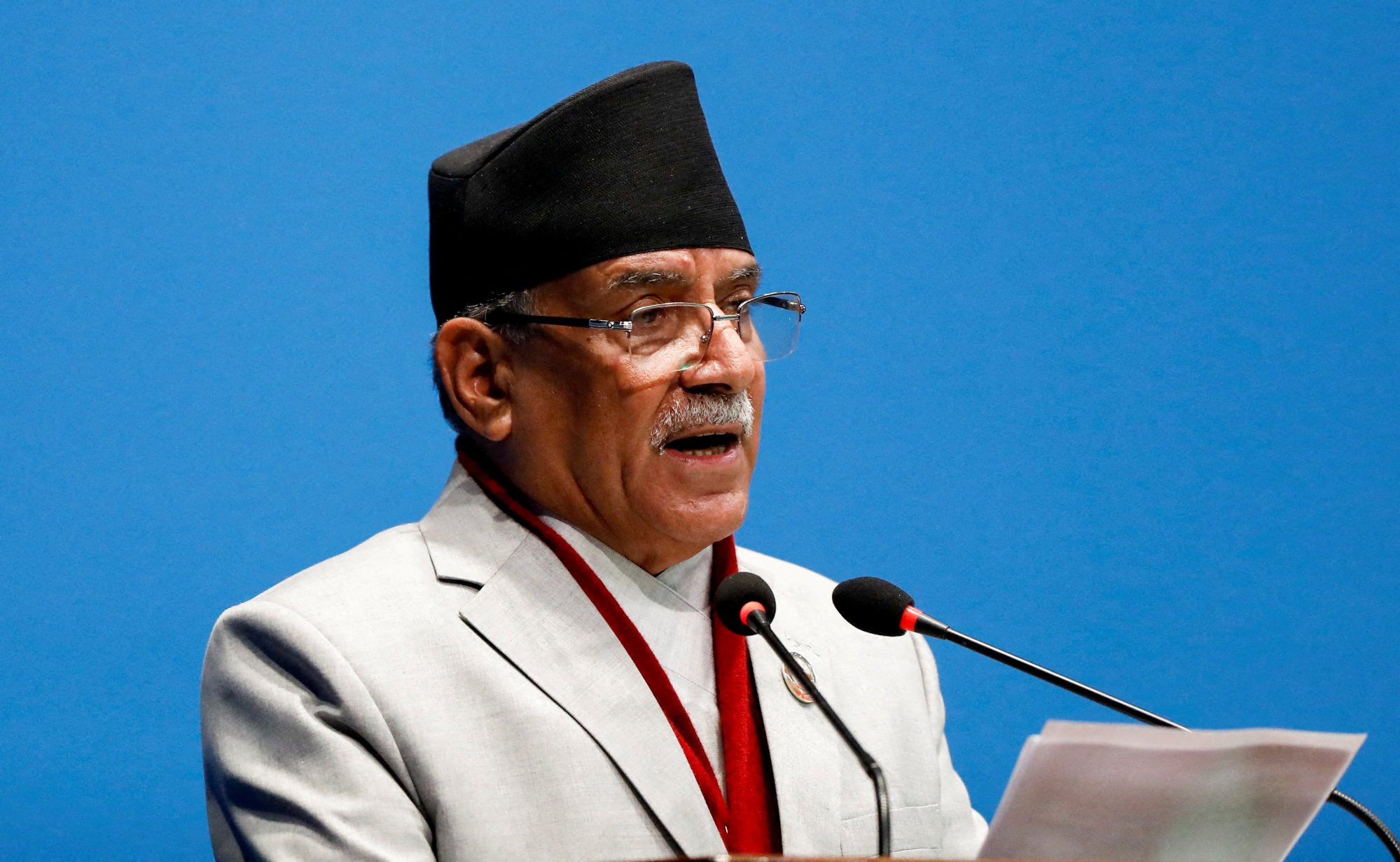
“Nepal will have to balance the US, China and India, at a time when relations between them are frosty,” he said.
“The political leadership of Nepal has never been in a position as challenging as it is now,” he added.


